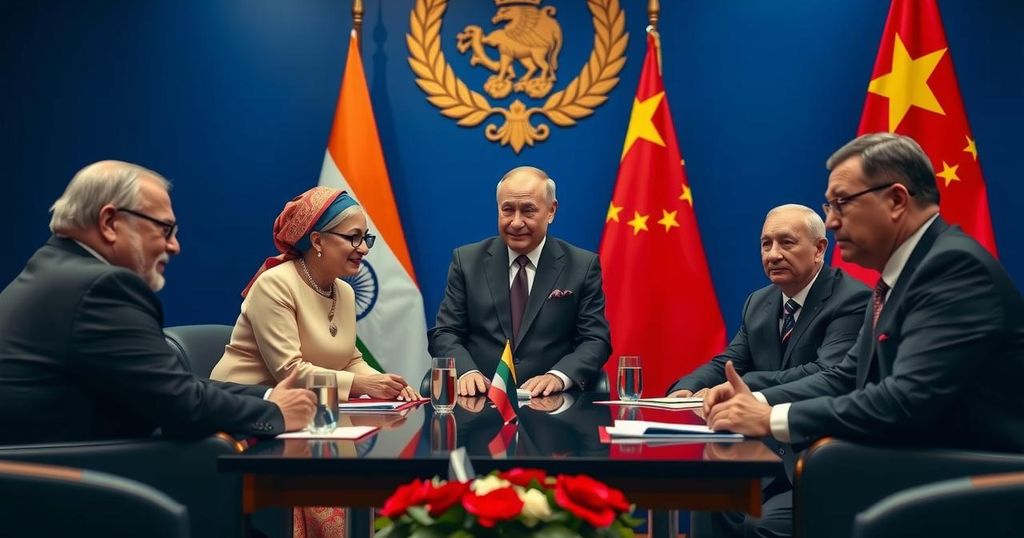Leaders of India, China, and South Africa Rally Behind Putin at Key BRICS Summit

During the BRICS summit in Kazan, Russian President Vladimir Putin engaged with leaders, including Indian Prime Minister Narendra Modi, who called for a quick resolution to the Ukraine conflict. Chinese President Xi Jinping praised the strong ties between Russia and China. The summit aims to exhibit that Russia is not isolated despite Western efforts, with discussions centered on establishing an alternative payment system and addressing global conflicts.
In a significant diplomatic gathering, Indian Prime Minister Narendra Modi called for a speedy resolution to the Ukraine conflict during discussions with Russian President Vladimir Putin in Kazan, Russia. This meeting occurred as China’s leader, Xi Jinping, emphasized the deep friendship between Beijing and Moscow amidst a tumultuous global order. Putin is hosting approximately 20 global leaders for a BRICS summit aimed at demonstrating that Western efforts to isolate Russia due to its actions in Ukraine have largely failed. Modi reaffirmed India’s belief in peaceful dispute resolution, stating, “We believe that disputes should only be resolved peacefully. We totally support efforts to quickly restore peace and stability.” On the other hand, Xi highlighted the strong collaborative ties between China and Russia, stating they have notably advanced the development and modernization of both nations. Although India has provided humanitarian assistance to Ukraine, it has refrained from directly condemning Russia’s actions, positioning itself as a prospective mediator by facilitating dialogue through recent visits to Kyiv and Moscow. Additionally, South African President Cyril Ramaphosa characterized Russia as a “valued ally” during his interactions with Putin, reinforcing the longstanding partnership forged during the anti-apartheid struggle. This summit, the largest international event in Russia since the Ukraine conflict’s inception, occurs amidst a backdrop of heightened security due to potential threats, including drone attacks from Ukraine. Topics slated for discussion include a proposed BRICS-led payment system to rival SWIFT, and the ongoing conflicts in the Middle East. Moscow’s consolidation of ties with adversaries of the United States, like China, Iran, and North Korea, has fueled concerns among Western powers regarding the potential geopolitical implications of a strengthened BRICS coalition. Political analysts perceive this gathering as an effort by Russia to showcase its resilience against Western isolation. Amidst evident internal divisions within the group, particularly between India and China, discussions highlight the challenges BRICS faces as it seeks to expand its influence and assert its presence in a multipolar world.
The BRICS summit, involving leaders from Brazil, Russia, India, China, and South Africa, is a platform for cooperation among emerging economies. Established in 2009, BRICS has evolved into an important mechanism for dialogue and collaboration in various sectors, including economics and geopolitical strategies. The coalition has faced challenges, particularly in terms of internal cohesion, with significant differences among member states regarding their relations with Western powers and their positions on global conflicts such as the Ukraine war. This summit comes at a crucial time as the international community navigates complex geopolitical landscapes exacerbated by conflicts, economic uncertainties, and shifting alliances.
The BRICS summit in Kazan serves as a platform for member countries to assert their autonomy and foster deeper ties, particularly in the backdrop of rising tensions between Russia and Western nations. Leaders like Modi and Xi are advocating for peace and collaboration, while simultaneously showcasing their respective nations’ relationships with Russia. The summit underscores the significance of BRICS in promoting a multipolar world, even as internal divisions and external pressures remain palpable.
Original Source: www.courthousenews.com








